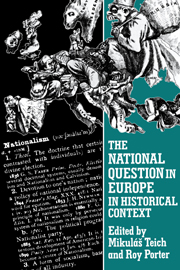Book contents
- Frontmatter
- Contents
- List of maps
- Notes on contributors
- Acknowledgements
- Introduction
- 1 The British Isles: Celt and Saxon
- 2 The making of the French nation
- 3 The national question in Italy
- 4 The roots of the national question in Spain
- 5 Shifting nationalism: Belgians, Flemings and Walloons
- 6 The nation in German history
- 7 Nationalism and nation-state in Germany
- 8 The national identity of the Austrians
- 9 The Czechs
- 10 The national question in Hungary
- 11 The union of Dalmatia with northern Croatia: a crucial question of the Croatian national integration in the nineteenth century
- 12 The national question in Poland in the twentieth century
- 13 Finland: from Napoleonic legacy to Nordic co-operation
- Index
9 - The Czechs
Published online by Cambridge University Press: 30 November 2009
- Frontmatter
- Contents
- List of maps
- Notes on contributors
- Acknowledgements
- Introduction
- 1 The British Isles: Celt and Saxon
- 2 The making of the French nation
- 3 The national question in Italy
- 4 The roots of the national question in Spain
- 5 Shifting nationalism: Belgians, Flemings and Walloons
- 6 The nation in German history
- 7 Nationalism and nation-state in Germany
- 8 The national identity of the Austrians
- 9 The Czechs
- 10 The national question in Hungary
- 11 The union of Dalmatia with northern Croatia: a crucial question of the Croatian national integration in the nineteenth century
- 12 The national question in Poland in the twentieth century
- 13 Finland: from Napoleonic legacy to Nordic co-operation
- Index
Summary
The national question belongs undoubtedly among the most complicated historical problems. In this respect each individual nation has had a different experience. Manifold historical conditions which varied in each individual case have played a decisive role. While studying the national question one has to bear in mind the many changes since the Middle Ages which were connected with economic and political conditions. Whereas modern nationalism and the process of solving the national question was very closely linked with the beginnings of capitalism one should be aware of the fact that the foundations of the development of nations had already been laid during the Middle Ages. Therefore it will be necessary, at least in the case of the Czech nation, to devote our attention to this problem.
THE MEDIEVAL NATION
Regarding the Czech Lands it was significant that medieval Bohemia, as well as Moravia, was inhabited not only by Czechs but also by Germans who lived in compact entities, especially in towns where they soon formed a German-speaking patriciate exercising decisive influence on the towns' administration. Already very early we can observe that the clergy, such as the chronicler Cosmas (1045–1125), were consciously expressing a common Czech national feeling. The explanation for this can be found in the immigration of the German clergy that filled the native Czech clergy with fear of competition for senior posts.
- Type
- Chapter
- Information
- The National Question in Europe in Historical Context , pp. 228 - 247Publisher: Cambridge University PressPrint publication year: 1993
- 1
- Cited by

